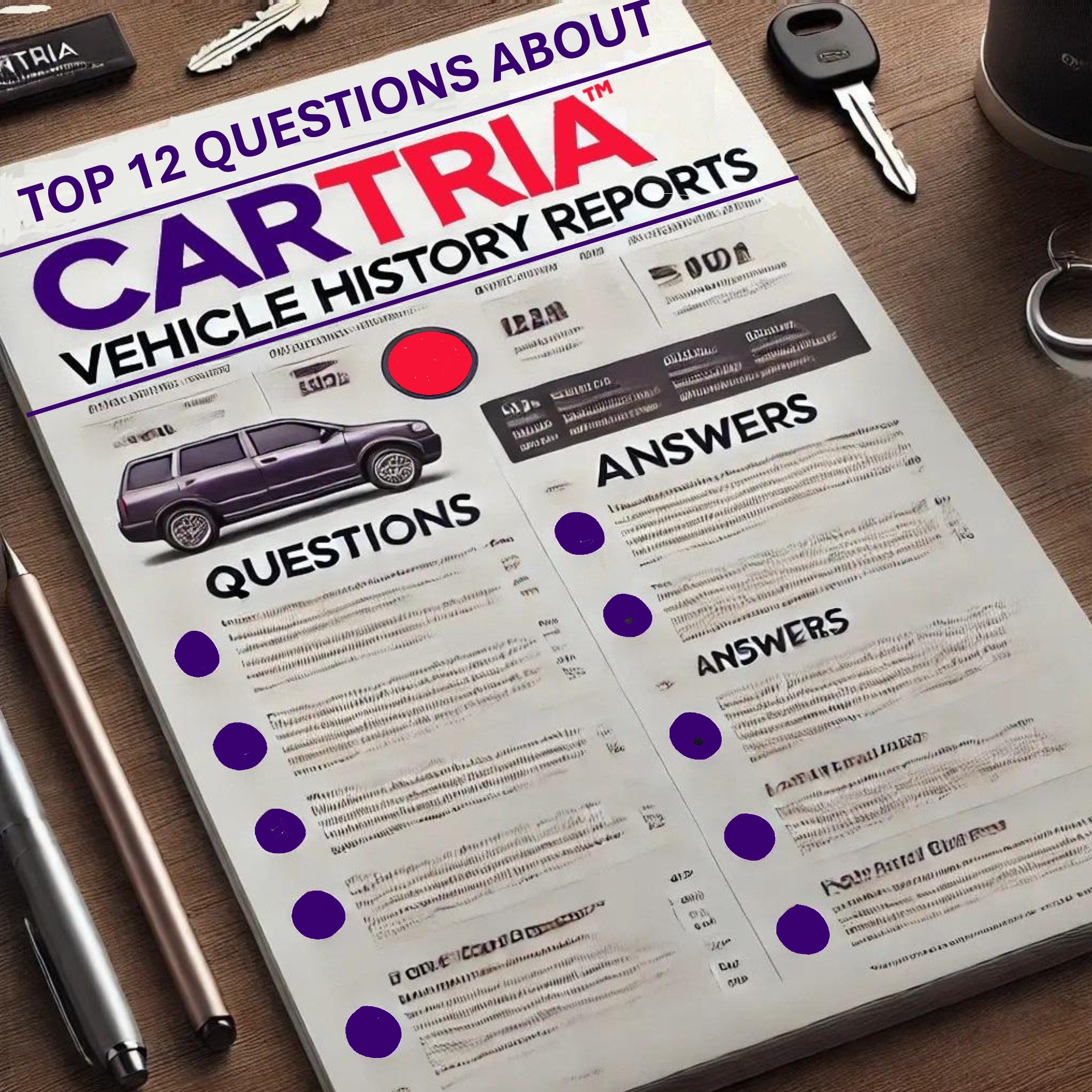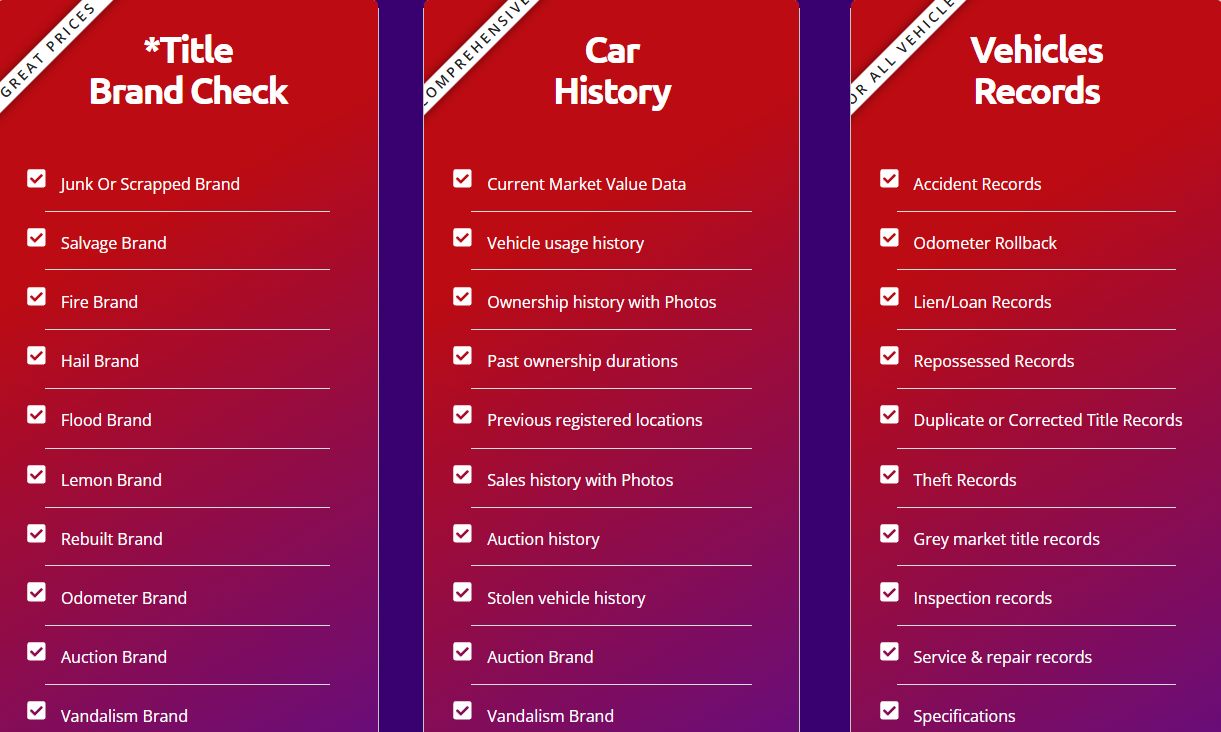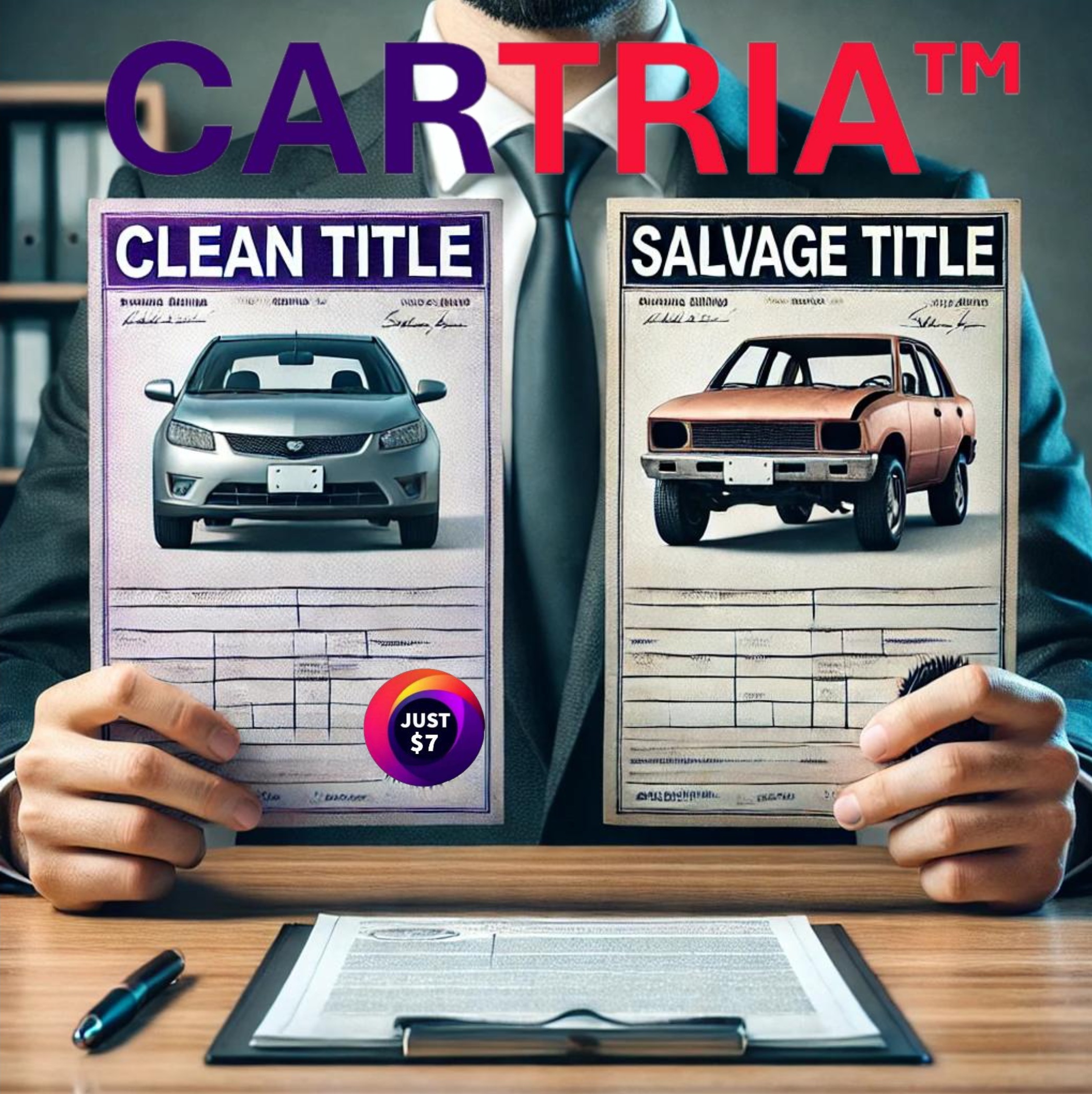Why a CARTRIA™ Comprehensive Vehicle History Report is Essential
When buying a used car, having a comprehensive vehicle history report is absolutely essential. It provides detailed insights into a car’s past, helping you make an informed decision and avoid costly mistakes. Whether you’re buying from a dealer or a private seller, always check the vehicle’s history before making a purchase.
CARTRIA™ offers the most comprehensive and affordable vehicle history reports for just $7, giving you all the facts you need to make a smart buying decision. In this post, we’ll guide you on how to read a vehicle history report and why CARTRIA™ is your best choice for getting one.
Why You Need a Vehicle History Report
A vehicle history report reveals crucial information about a car’s past, from its first registration to its current status. It helps you understand the full story behind the vehicle, ensuring that you don’t end up with expensive surprises after purchase.
With the rise of online car buying and private sales, vehicle history reports have become more critical than ever. A vehicle may look perfect on the outside but have hidden issues that can cost you thousands of dollars in repairs down the road. By examining a vehicle history report, you gain insights into accidents, title history, odometer readings, and more, allowing you to make an informed and confident purchase.
What is a Vehicle History Report?
A vehicle history report is a detailed document that reveals the complete background of a used car. It provides vital information, including:
- Ownership History – Details about previous owners, including how long they owned the vehicle and where it was registered.
- Title History – Information on the car’s legal status, such as clean titles or branded titles that indicate past issues.
- Accident History – Records of reported accidents, including the severity of damage and airbag deployment.
- Odometer Readings – Mileage records to detect odometer rollback or tampering.
- Maintenance Records – Information on routine maintenance, repairs, and recall history.
With this information, you can avoid buying a car with hidden problems, ensuring a safe and reliable purchase.
- Ownership History
This section shows the number of previous owners, the duration of each ownership, and the type of owner (personal, commercial, rental, etc.). It also reveals the locations where the vehicle was registered, which is important for issues like rust or wear due to harsh climates.
Tip: If the car spent several years in snowy, salt-heavy regions, be sure to check for rust. Vehicles used for commercial purposes or as rental cars often have higher mileage and more wear and tear.
- Title History – Understanding Branded Titles
The title history is one of the most critical sections to review. A clean title is what you’re looking for. However, some titles are marked as branded titles, which signal serious issues.
A branded title is a label on a car’s title that shows it has had serious problems in the past, like major accidents, flood damage, or being declared a total loss. It warns buyers about potential issues with the car’s safety, value, or reliability.
Common types of branded titles include:
- Salvage Title – Declared a total loss by an insurance company due to severe damage, flood, or theft.
- Rebuilt or Reconstructed Title – The vehicle was repaired after being declared a total loss.
- Flood, Fire, or Hail Damage – Damage from natural disasters that can cause ongoing mechanical or electrical issues.
- Lemon Law or Junk Title – Returned to the manufacturer due to significant defects.
Pro Tip: Avoid branded titles if possible, as they can lead to higher insurance premiums and lower resale value. If you’re considering a vehicle with a branded title, have it thoroughly inspected by a trusted mechanic.
- Accident and Damage History
One of the most important reasons to get a vehicle history report is to check for any accidents or damage the vehicle may have sustained.
Accidents and Airbag Deployments
This section provides details about accidents, including the severity and location of the damage. Airbag deployments usually indicate a significant accident.
Did You Know? Not all accidents are reported, so it’s a good idea to have a trusted mechanic inspect the car if you suspect any issues.
Structural Damage
Structural damage reports alert you to any issues with the car’s frame or chassis, which can significantly impact safety and resale value.
Warning: Structural damage can compromise the integrity of the vehicle. Always proceed with caution.
- Odometer Readings and Mileage Verification
Accurate mileage is crucial when buying a used car. A vehicle history report provides odometer readings recorded during various events, such as title transfers and maintenance checks.
Mileage Consistency
The mileage should increase steadily over time. Watch out for inconsistencies that may indicate tampering.
Odometer Rollback or Tampering
Inconsistent or decreasing mileage is a major red flag. Odometer fraud is illegal and can mislead you about the car’s wear and tear.
Quick Tip: Compare mileage records from different events to ensure consistency. If the mileage appears suspicious, it’s best to walk away from the deal.
- Maintenance and Service Records
Maintenance records give you a glimpse into how well the vehicle was cared for by its previous owners. Although not all repairs are reported, a consistent service history is a good sign of responsible ownership.
Routine Maintenance
Regular oil changes and scheduled services show that the vehicle was properly maintained.
Major Repairs
If the car underwent significant repairs, check to see if they were done by certified technicians.
Fact: Vehicles with consistent maintenance records generally have a longer lifespan and better resale value.
FAQs About Vehicle History Reports
Are vehicle history reports always accurate?
While vehicle history reports are highly reliable, they rely on data reported to agencies. Some accidents or repairs may go unreported. It’s always a good idea to have a mechanic inspect the car.
Should I buy a car with a branded title?
Only if you’re fully aware of the risks and have had the vehicle inspected. Branded titles lower the resale value and can make insurance more expensive.
Why Choose CARTRIA™?
While there are several options for vehicle history reports, including AutoCheck and Carfax, CARTRIA™ stands out because it offers:
- Comprehensive Reports for Just $7 – The most affordable and transparent option in the industry.
- No Memberships or Hidden Fees – Get all the facts upfront with no teaser reports, upsells, or complicated pricing plans.
- All the Facts You Need – CARTRIA™ provides detailed insights comparable to Carfax and AutoCheck but at a fraction of the cost.
Exclusive Offer: For just $7, you get the most comprehensive vehicle history report available. That’s the industry’s lowest price without sacrificing quality or detail.
Make an Informed Decision
Buying a used car without checking its history is risky and can lead to costly mistakes. A CARTRIA™ comprehensive vehicle history report gives you all the information you need to make an educated decision and buy with confidence. Whether you’re buying from a dealership or a private seller, don’t take any chances—always check the history first.
Get Your CARTRIA™ Report Today
Before purchasing a used car, make sure you have all the facts you need with a CARTRIA™ vehicle history report. At just $7, it’s the smartest investment you can make to avoid surprises and get the best deal.



